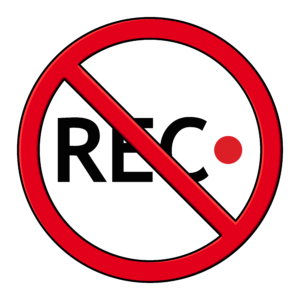 “It is ok for me to record the meeting, isn’t it?” asks the stressed employee client who has been invited to a performance meeting but is anxious at the very idea of it. Some employees fear that once the questioning gets under way, stress levels will rocket and they will not present their best version of events or remember exactly what was said.
“It is ok for me to record the meeting, isn’t it?” asks the stressed employee client who has been invited to a performance meeting but is anxious at the very idea of it. Some employees fear that once the questioning gets under way, stress levels will rocket and they will not present their best version of events or remember exactly what was said.
With the prevalence of devices in our everyday lives, many of us have become used to pressing the record button on our phones as a short-cut for writing anything down. As audio (and video) recordings become more frequently used, it is likely that some individuals may prefer it as a means of recording what is said at work meetings.
There may be good reasons why employees feel that an audio recording of a meeting better protects their position or is necessary to demonstrate that they are the subject of, for example, discriminatory remarks. However, there is no right to record a meeting unless both parties agree to do so. Not all cases of covert recording in the workplace will relate to formal meetings. It is possible that one employee could record another employee making discriminatory remarks, without them knowing, in order to provide evidence of what they are having to endure in the workplace.
In this article, we summarise the key elements of the law relating to covert recordings in the workplace by reference to six practical tips for employers handling covert recordings by an employee. This is not just an employee-related issue. Many employers may also want to covertly record employees, for example, to identify criminal activity or malingering. Whilst not within the scope of this article, that also gives rise to a number of issues and we recommend employers seek legal advice before undertaking any such monitoring exercise.
- Spend some time revising your policies. In the 2019 decision of Phoenix House v Stockman, the Employment Appeals Tribunal (EAT) said that, unless there were pressing circumstances, covert recording of a meeting by an employee is more likely to be misconduct than gross misconduct. The attitude of the employer to covert recordings is a relevant factor so you should make sure your Disciplinary Procedure categorises it as gross misconduct if that is how your business feels. The EAT seemed to anticipate more employers categorising it in this way following its decision.
- Think about revising your template or precedent documents. One of the key considerations for the EAT in Stockman was the employer’s attitude to covert recording. If the employer can show that its policy on this was unambiguous and brought to the attention of the employee, it will be harder for the employee to argue lack of awareness of the employer’s views. It is worth ensuring that your (standard or bespoke) letter inviting an employee to a meeting (e.g. disciplinary, grievance, performance, redundancy) confirms that employees are not entitled to record the meeting either by audio or video and, if they are found to do so, this could be treated as a disciplinary offence. You can reiterate in the letter that a neutral person will be in attendance to take notes. Remember that the employee, or any person that accompanies them, can also take notes. The employer’s relevant policy can explain that the employee will be invited to comment on any notes of the meeting and will have a chance to register any instance in which recollections vary.
- For the conduct of the meeting, provide those leading it with a checklist to ensure that they have asked for:
- Confirmation that none of the attendees are recording the meeting and that they are aware of the employer’s policy on covert recordings;
- Confirmation that all attendees have turned off their mobile phones.
Should the meeting need to be adjourned for further deliberations, you could recommend moving the individuals involved in the deliberations to a separate room so that, if the meeting is being recorded, those deliberations are less likely to be captured on the recording. After any adjournment, it is worth re-confirming a. and b. above. In Stockman, the EAT drew a distinction between an employee who was told not to make a recording or lied about doing so and one who scarcely thought about whether it should be done or not. If the employer is clear about the policy at all times, it will be difficult for employees to argue that they hadn’t given the recording a moment’s thought. Remember, if employees are doing something they know they shouldn’t be doing, their behaviour may often give it away!
- Encourage line managers (typically those hosting these meetings) to be flexible. There may be situations where someone needs to turn their phone on. If there is no other way of dealing with this (e.g. postponing the meeting), then an exception might need to be made. Similarly, an employee may put forward some reason why they need to record the meeting – for example, a medical condition which makes it very difficult for them to concentrate and you may need to consider relaxing your policy if no reasonable alternative can be found. If you do so, there may be further requirements to address, particularly in relation to data protection obligations and privacy rights. Be aware that the data protection breaches involved in a video recording could be more serious than in an audio recording because more sensitive personal data (e.g. gender, age, disability) is likely to be apparent.
- If an employee has gone against policy and records a meeting and brings something to your attention, you will need to take it seriously and act on it. Otherwise you may find that you face a claim for constructive dismissal and/or victimisation depending on the circumstances. If you identify a data protection breach, it will need to be recorded and may also need reporting to the ICO. Bear in mind that you may also face complaints from another person who has been covertly recorded about breach of privacy or data protection law.
- How you deal with the individual concerned will depend on the facts. If this is a clear breach of policy, then it could start a disciplinary process, although you will need to be clear that the covert recording is the reason for that process rather than, for example, any complaint about discrimination. You will also need to determine if (intentionally or not) confidential information has been recorded and you may need to take steps to protect that, normally through contractual undertakings in the first place or through an injunction if it is very serious. Alert senior management and take legal advice.
Ultimately it pays to have considered this topic in advance so that you have your protocols in place. Covert recordings can be used in evidence for claims, e.g. if someone brings a claim for unfair dismissal in response to being dismissed for making a covert recording and/ or resigning because of something said in a covert recording. The Tribunal will have a discretion over whether to allow it assessing its “relevance” to the issues in play and it would need a reason such as public policy to override that. If the Tribunal does allow it, it has a number of tools for ensuring that someone will not benefit from breaching policy in this way. Even if a dismissal is found to be technically unfair, the Tribunal can decide to reduce compensation to zero or make a costs order against the party who did the recording. Following our six practical tips will help you to navigate your way around the subject of covert recordings so that you don’t get caught out.


Leave A Comment